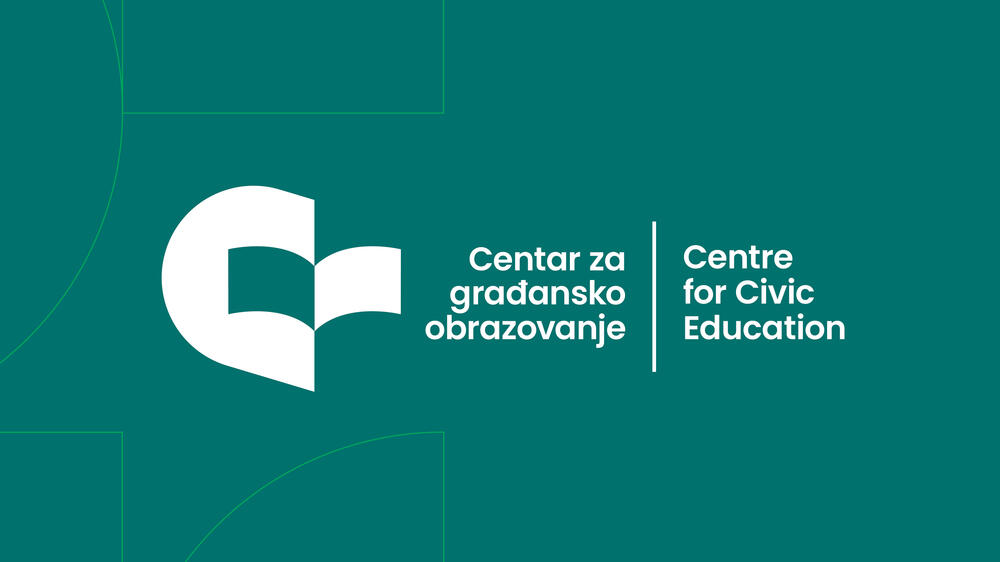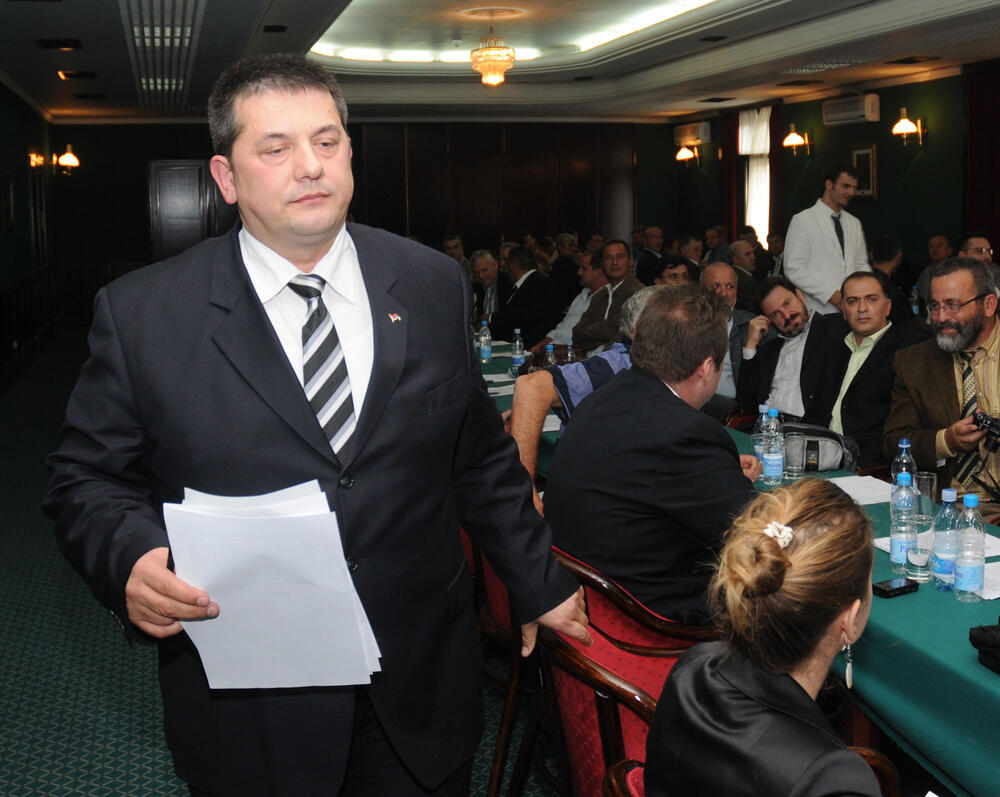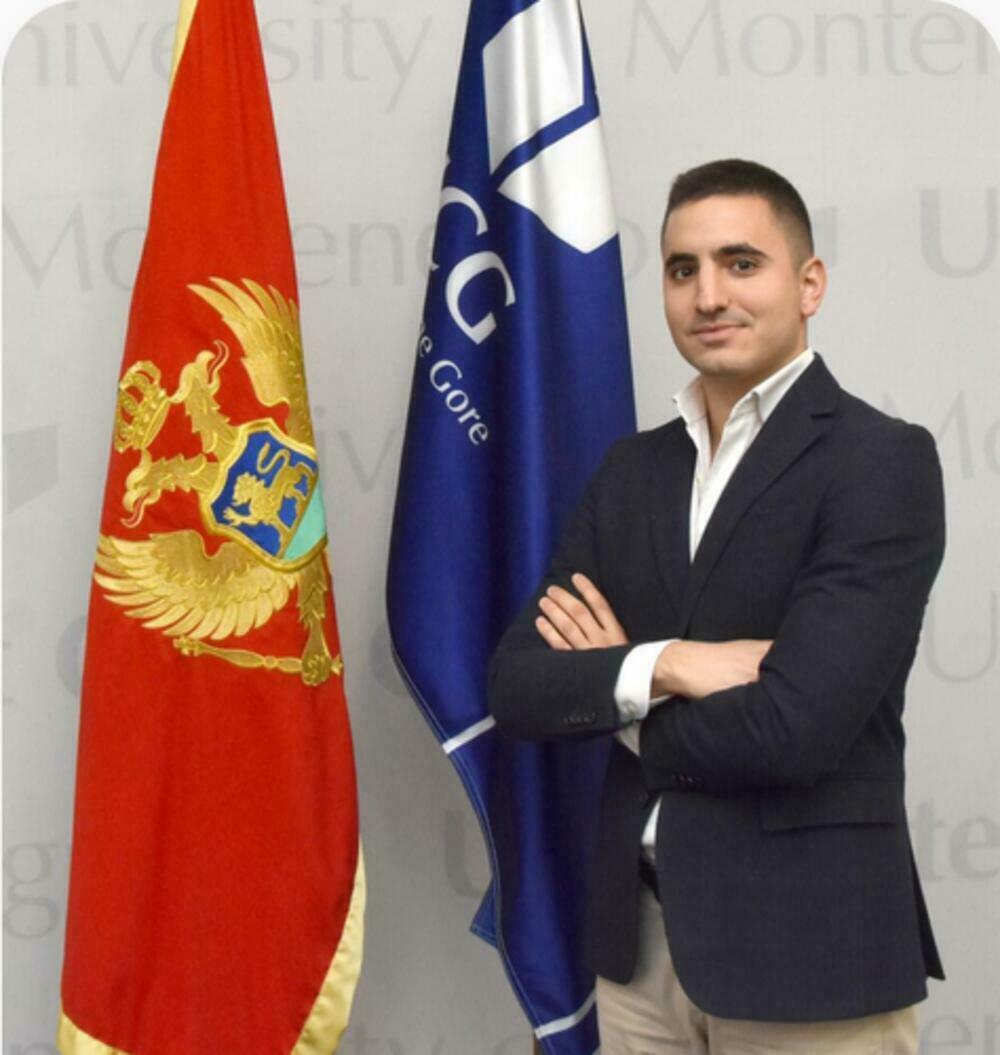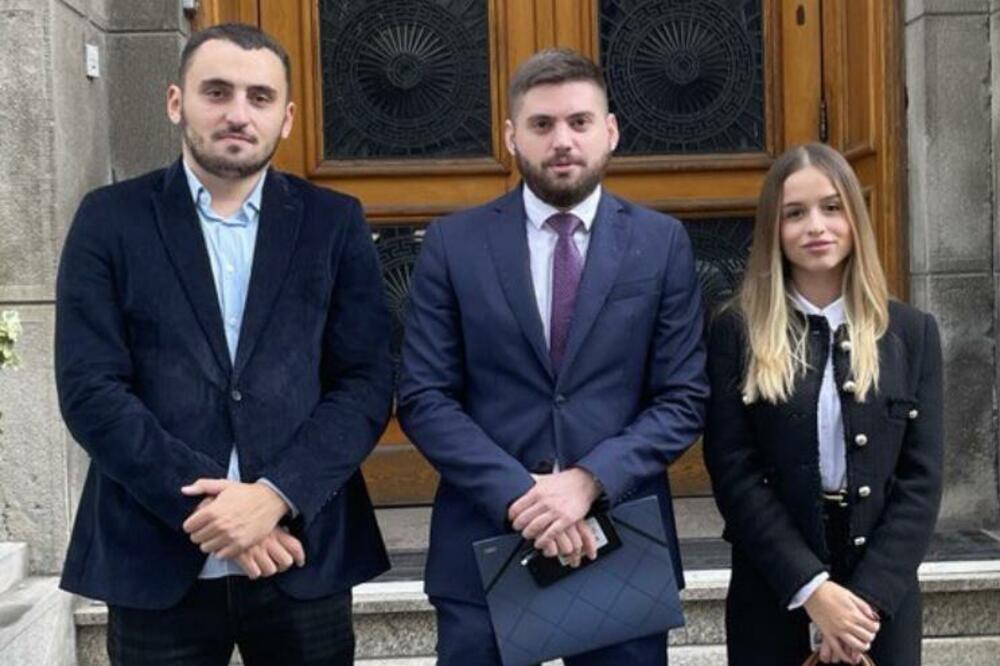It is uncertain whether and when the initiative of the Union of Montenegrin Students in Serbia on census forms as a condition for financing studies in Serbia will be adopted. So far, the Ministry of Education of the Republic of Serbia has not announced anything about this topic, nor have they answered the questions of "Vijesti" about this proposal.
He was not more specific about the eventual adoption of the initiative Vuk Orovic, a law student, a member of the delegation of the Union of Montenegrin Students in Serbia, which disclosed this idea last Sunday, at a meeting in the Government of Serbia.
"We think it is ungentlemanly to present the data from the meeting. All in all, we are satisfied with their answer and we expect the initiative to be adopted", said Vuk Orović for "Vijesti".
It is indicative, however, that the relevant minister was not present at the meeting with the representatives of the Union of Students of Montenegro in Serbia. Slavica Djukić Dejanović. Instead, they met with a student delegation from Montenegrin universities Nikola Selakovic, Minister of Labour, Employment, Veterans and Social Affairs, and Milos Vucevic, the Minister of Defense, but also the President of the Serbian Progressive Party (SNS). Given that the issue of studying foreign students is not in the portfolio of the two ministers present, many are inclined to interpret this happening as a party activity of progressives that they wanted to put under the mantle of the Government of Serbia. From that point of view, the absence of Minister Dejanović (SPS) was logical.
The Union of Montenegrin Students in Serbia is not even registered yet
The upcoming census, by all accounts, prompted the Serbian authorities to hurry with the disclosure of this initiative because the Union of Montenegrin Students in Serbia, explains Orović, is not yet registered as a student organization.
"As for the legal position of our organization, we have been operating on an informal level for several months. We have 54 members in our group, and soon we will register with the Agency for Business Register (APR), for the sake of easier functioning and appearing in public", explains Orović.
The non-governmental organization Center for Civic Education (CGO) is not surprised by this approach of the authorities in Serbia.
"It is clear that official Belgrade is trying to achieve its political goals towards Montenegro by all means and using all forms of influence trading, even when it clearly crosses borders. That is why this idea was given to the representatives of the Union of Montenegrin Students in Serbia, direct interference in the internal issue of Montenegro", say the CGE.
Vuk Orović, a law student, has the opposite opinion.
"This initiative is the result of an extensive analysis made by a large number of students. We believe that it is necessary to strengthen the connection between the Republic of Serbia and its diaspora. Every year, a large number of students from Montenegro, regardless of nationality, find their place in the Republic of Serbia. We believe that the adoption of our initiative would represent a healthy message from the Republic of Serbia to its diaspora that they are more than welcome to study and improve here", said Orović, noting that claims about some kind of open interference by Serbia in the list are "complete nonsense".
He further states that as an organization of Serbian students from Montenegro studying in Serbia, they came up with the idea of submitting this initiative to the Government of the Republic of Serbia. Orović wonders what kind of interference we are talking about when it comes to an ordinary citizen-student initiative, of which there are hundreds.
CGO: It is easiest to manipulate young people
In the Center for Civic Education, however, they point out that "it is easiest to manipulate young people who do not have enough experience to recognize different forms of manipulation."
"They are especially vulnerable when they try to find the most favorable ways to provide themselves with the best possible education or employment, which is also part of their existential needs. The timing of such an offer from the authorities from Serbia on the eve of the announced census, which is already seriously polarizing society in Montenegro precisely because of identity issues, completely cancels out the impression that it was a benevolent gesture," the CGO states.

Vuk Orović, on the other hand, emphasizes that the system of positive discrimination for members of the Serbian diaspora who decide to pursue higher education in the Republic of Serbia has existed for a long time, but for a long time there was a legal gap which, in his words, made this, in his words, extremely noble provision, de facto made sense.
"In fact, at one point, the question of the means of proof through which the students would prove their belonging to the category of the Serbian national corps was raised. Since for many years it was enough for interested candidates to state that they were Serbs upon admission to the faculty, a long series of abuses appeared that had a number of consequences. On the one hand, this kind of practice rendered meaningless an extremely noble and modern provision, otherwise characteristic of a large number of foreign countries (if we are talking about the region, we have the best examples in similar provisions in force in Hungary, Slovenia and Croatia). On the other hand, the number of abuses has been maximized, as a result of which the rights and position of the Serbian people in the diaspora have not been improved, which is one of the essential ideas of this provision, and at the same time, the budget of the Republic of Serbia has been damaged in this way over the past ten years by several million euros," Orović points out. , wondering "how Montenegrin society, recognized for centuries as a collective that propagates the ideals of justice, honor and honesty, through one long and gloomy night embodied in the rule of the DPS regime, grew into a society that openly defends thievery and teaches children to steal, lie and they are cheating".
He emphasizes that not a small number of persons who, when registering in Serbia, would declare themselves as Serbs, "by their unconcealed actions to the detriment of the Serbian people within Montenegro, prove the already mentioned legal loopholes".
In this way, in addition to illegally providing for themselves benefits in studies in the form of study conditions identical to those of students who are citizens of the Republic of Serbia, they could continue their anti-Serb activities in Montenegro unhindered.
"It is not at all clear to me why certain structures of society feel so anxious. No one prevents Montenegrins from declaring themselves as they wish. If they, on the other hand, consider that the call for free studies in Belgrade (and therefore access to student dormitories and all other rights reserved for persons of Serbian nationality) is stronger than their national identity, that is a question of the strength of their national identity, and not a question of some kind of interference in the list", Vuk Orović believes.
It should be emphasized, CGO points out, that for current Montenegrin students in Serbia, as well as those who want to study in Serbia in the future, the Law on Higher Education of Serbia enables free studies under the same conditions as citizens of Serbia only if they qualify in terms of quality.
"More precisely, Article 97 of that Law stipulates that candidates can enroll in accredited study programs organized by a higher education institution under the conditions and in the manner regulated by the law and the general act of the independent higher education institution. A foreign citizen can enroll in study programs under the same conditions as Serbian citizens in terms of previous education, so the national designation does not represent any facilitating category for them, which only confirms the extent of this manipulation", the Center for Civic Responsibility (CGO) emphasizes.
It is quickly forgotten that law degrees from Montenegro were not recognized in Serbia
Orović, however, warns that, as he says, upon completion of the census, every person has the right to receive a certified copy of the census sheet, and that after receiving a certified copy of the census sheet, the owner has the absolute right to do whatever he wants with it.
"The legislation of the Republic of Serbia refers to the Serbian legal system. Given that the Republic of Serbia and Montenegro are two independent states, I do not see how the Republic of Serbia could in any way violate the legal system of another state by adopting an internal act that refers to natural persons. Legislative acts of Montenegro cannot be applied on the territory of the Republic of Serbia. Any kind of pretension of that nature represents scandalous attempts to interfere in the internal affairs of the Republic of Serbia. Simply, in the case of the adoption of this act, those who wish to study from the budget, will attach a certified copy of the census list, and those who do not wish to do so will not", somewhat laconically explaining the new situation regarding this initiative.
CGO reminds that not so long ago we had different policies in relation to students from Montenegro.
"The violation of the Lisbon Convention by the ENIC/NARIC of Serbia for two full years and the non-recognition of diplomas obtained at the Faculty of Law of the University of Montenegro for the needs of the labor market in Serbia was too quickly forgotten, and the same policy of non-recognition of diplomas applied to all law faculties in the region. At that time, that is, six years ago, the CGE submitted to the Ministry of Education of Montenegro an initiative to resolve this issue at the bilateral level of governments in order to protect the quality of educational documents of the State University of Montenegro. Even then in 2017, the Government of Montenegro was more careful not to hold grudges against the Government of Serbia than to deal with the interests of our students", this non-governmental organization warns.
In the Center for Civic Education, they point out another aspect that concerns the enrollment of students based on nationality.
"This, in particular, should not be of any influence if Serbia relies on the quality of the knowledge acquired in the diploma. We believe that it would be a defeating policy for Serbia and its higher education if, for example, students from any other country, in this case from Montenegro, were to enroll in free studies based only on data from the census, regardless of the previous quality of the acquired knowledge and the fulfillment of the conditions for enrollment, which could be at the expense of high-quality students from Serbia itself," the CGE states.
Raičević part of the protocol
Although it was not stated in the announcement of the Government of Serbia, he attended the meeting of the delegation of the Union of Montenegrin Students in Serbia, as can be seen in the photos from the conversation, and Gojko Raicevic, who is reputed to be the editor-in-chief of the In4S portal, an unregistered media outlet in Montenegro. In the imprint of the unregistered portal, it is not stated that Raičević is the responsible person, but it is stated that the editor-in-chief is the Cuban boxer Felix Savon.
Raičević did not answer the questions of "Vijesti" in which capacity he was at this meeting, and Vuk Orović did not know the answer to this question either.
"You addressed the wrong person, given that I did not create the protocol of the meeting," Orović said.

The portal headed by Raičević launched the "Proud of your Serbian" campaign before the census and stated that one of the first activities of the campaign is 50 billboards in Montenegro, "which will remind fellow citizens and compatriots of Serbian origin and identity".
This summer, the IN4S portal, among other things, published a text in which the leader of the Croatian Citizens' Initiative was called "Pavelić and Tuđman's chatter", and then he characterized the offensive chanting in a club in Ulcinj as a "Siptar shack".
"The truth is that IN4S does not adhere to generally accepted journalistic 'standards' and that makes us more attractive for attacks, mostly without any basis," Raičević said at the time.
No response from the relevant ministries
Neither the Serbian Ministry of Education nor the Montenegrin Ministry of Education answered the questions of "Vijesti" about the initiative of the Union of Students of Montenegro.
We were also left without a response from the Union of Serbian Students and the Student Union of Serbia.
Without lists and statements
"We are not familiar with the work, membership and way of functioning of the Union of Students of Montenegro in Serbia. As far as we are aware, the said association is not registered in the Republic of Serbia, nor in Montenegro, but it is a self-proclaimed association of students that had a meeting with the officials of the Republic of Serbia", said the president of the Student Parliament of the University of Montenegro (SPUCG). Andrej Vukcevic.
On the other hand, he points out, SPUCG wholeheartedly supports all legal and legitimate forms of student organization aimed at improving the position of students who have found themselves in the same problem or have the same interests.
"As someone who represents the interests and fights for the position of our students, I think that any type of political interference and decisions that can be questionable from the point of view of interfering with the absolute privacy and freedom of expression of students is not good," emphasizes Vukčević.

The President of the SPUCG is of the opinion that our students should enjoy the same rights as students from the Republic of Serbia who enroll at the University of Montenegro and private universities in Montenegro, without signing any declaration that they are members of any national corps, according to the principle of reciprocity.
It would even be discriminatory in some way, explains Vukčević, if the enrollment conditions of students from the region, in this particular case from the Republic of Serbia, depend on their declaration on the census in their home country.
"The Law on Higher Education of Montenegro, according to Article 100, strictly stipulates that "a foreigner has the right to enroll in study programs in Montenegro under the same conditions as Montenegrin citizens, in accordance with this law and the statute of the institution".
"Taking into account that studies at the University of Montenegro are free, students from other countries only need to have a good average as the only criterion that will rank them for admission," points out Andrej Vukčević.
However, he believes that the fact that Montenegrin students used the option to be exempted from paying tuition fees at universities in the Republic of Serbia through a somewhat more informal procedure and approach, and on the same basis, should also be highlighted, which for years no one spoke about with any negative connotation.
"Therefore, the question arises of choosing the timing for starting a discussion on this topic and for presenting this idea, which is undoubtedly conditioned by the announced procedure of the population census in Montenegro," said Vukčević.
He notes that it is much more important for students than the daily politics and discussions that we witness every day on our public stage, that they finally get conditions worthy of studying and reach the standard that has been a reality in many European countries for many years.
"Therefore, as before, as the most important student institution in our country, we will contribute to all the positive processes taking place, but also be critics of all the shortcomings we see for our students in the country and those who are studying outside of Montenegro", he concludes. Andrej Vukčević, president of SPUCG.
Bonus video:






